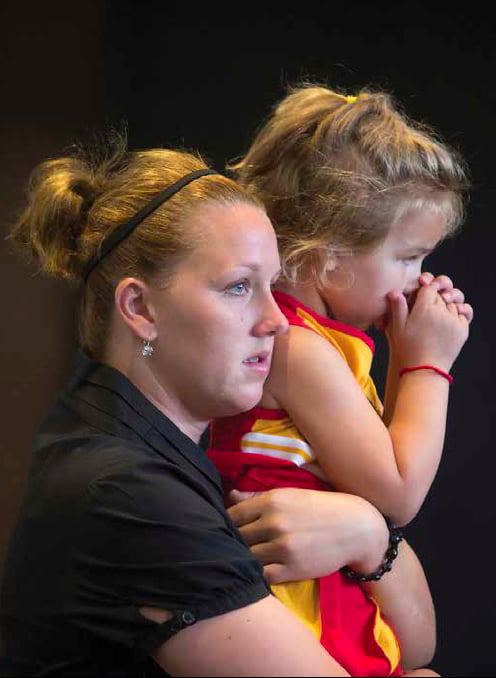
Erin Duvall, a member of St. Patrick Parish in Kansas City, Kan., holds her daughter Riley at last year’s Mass of Innocents at Savior Pastoral Center. This year’s Mass of Innocents will be celebrated on Oct. 20.
by Jessica Langdon
jessica.langdon@theleaven.org
KANSAS CITY, Kan. — Deacon Tony Zimmerman couldn’t forget the question a grieving mother asked him.
“Can you tell me if this pain is ever going to go away?” asked the woman, whose baby had died prior to birth.
Deacon Zimmerman, lead consultant for the archdiocesan office of marriage and family life, couldn’t make that promise.
Many times, he said, he thinks “reconcile” might be a better way to describe what happens as families grieve and pray and work to make sense of their loss in terms of who they are and who God is.
To help families through this process, Archbishop Joseph F. Naumann is inviting all who have experienced such losses to join him at the Mass of Innocents, which he will celebrate at 10 a.m. on Oct. 20 at Savior Pastoral Center in Kansas City, Kan.
“This Mass is so important because it gives a chance to come together at the Eucharist with the bishop, with other people who are suffering, and to seek healing,” said Deacon Zimmerman.
Mary Vorsten, a licensed clinical professional counselor and former director of Catholic Charities’ counseling program, agreed.
Vorsten has counseled families that have attended a Mass of Innocents.
“This Mass — that acknowledgment of the loss of this innocent life — is very important to them,” she said. “I think the Mass can bring [families] great comfort.”
A moment many parents find particularly meaningful is when they are asked to write their child’s name in a Book of Remembrance. It is sometimes the first time they’ve given the child a name.
“That’s really helpful for them,” she said, noting that, too often, this very real loss can go unrecognized and acknowledged by others.
The Mass of Innocents is open to all who have lost a child, whether the loss is recent or happened decades ago.
It has already become a yearly tradition for Brad DuPont and his wife Libby, consultants for the office of marriage and family life.
Even if they weren’t at the Mass in their archdiocesan capacity, he said, they would attend for the value it holds for them as parents.
Two of their four children — son Peter and daughter Gianna — died of a rare genetic condition when they were only a few months old.
“It’s a beautiful Mass,” said Brad DuPont. “And for my son, it’s a great opportunity for him to remember his brother and sister.”
Their youngest daughter was born after her brother and sister died, and DuPont believes the Mass will help her feel connected to her siblings in heaven as she grows older.
“So often the world forgets,” said DuPont, stressing that no matter how much time passes, the suffering and pain that accompany a loss are there and are very real.
This Mass shows that the church and Christ remember their suffering.
“The church wants to say, ‘We don’t forget your children,’” said DuPont.
This is a time for families to see they are not alone.
A gathering afterward provides an opportunity for fellowship.
Reaching out
Many people don’t realize the degree of grief that parents can suffer from the loss of an infant to miscarriage or stillbirth, and often say things that are not comforting to the family, said Mary Vorsten, a licensed clinical professional counselor.
One thing that friends and family can say is simply: “I’m sorry,” she said, or “I’m sorry for the loss of your child.”
Nor is there a criterion for how or how long they’re permitted to grieve.
Even parents don’t necessarily grieve the same way, she said.
“The mother has what I would call an intense maternal bonding with that child,” said Vorsten, and might feel deep sadness and bereavement.
“The father may be feeling helpless — and angry that he feels so helpless,” she said, adding that a father often bonds during pregnancy through feelings of protectiveness for the mother and child.
It’s important to recognize that both parents are grieving, she said, emphasizing the importance of the word “we.”
“He was four months old in the womb when we miscarried,” a parent might say, Vorsten offered as an example.
The loss of an infant can also weigh on siblings who were anticipating the arrival of the child, as well as on grandparents and other members of the family.
Even if there is not a funeral, particularly in the case of a miscarriage, Vorsten encourages families who have experienced a loss to do something together in honor of the child, and to cry and pray together.
To show support for those who have suffered a loss, you might ask a mother or father how they are doing, she said, and then let them know they are in your prayers.
“I lit a memorial candle for you and your child” is one thing you can say, said Vorsten.
For grieving parents, she encourages infant loss support groups.
There are also books on infant loss that can provide support to parents, she said.
For more information and additional resources, visit the archdiocesan website at: www.archkck.org/miscarriage-and-infant-loss.






